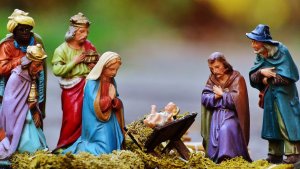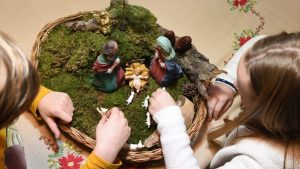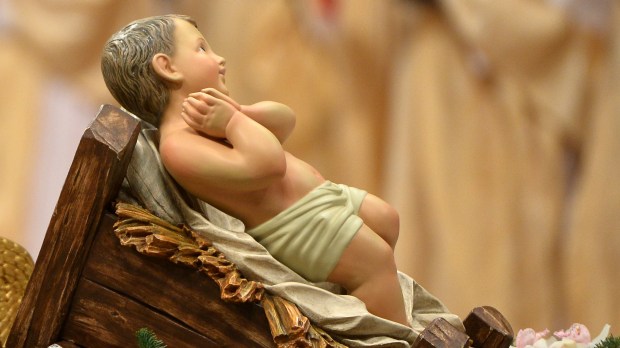Pope Francis celebrated Christmas Eve Mass in St. Peter’s Basilica, and emphasized in his homily that the love of the Christ Child cannot be earned, for it is freely given.
For better or worse, in sickness and in health, whether happy or sad, in his eyes we are beautiful, not for what we do but for what we are. Deep within us, there is an indelible and intangible beauty, an irrepressible beauty, which is the core of our being.
~
“Those who dwelt in a land of deep darkness, on them has light shined” (Is 9:1). The prophecy we heard in the first reading was fulfilled in the Gospel: as shepherds kept watch over their flocks by night, “the glory of the Lord shone around them” (Lk 2:9). In the midst of our earthly night, a light appeared from heaven. What is the meaning of this light that shone in the darkness? Saint Paul tells us: “The grace of God has appeared”. The grace of God, “bringing salvation to all” (Tit 2:11), has shone on our world this night.
But what is this grace? It is divine love, the love that changes lives, renews history, liberates from evil, fills hearts with peace and joy. Tonight the love of God has been revealed to us: it is Jesus. In Jesus, the Most High made himself tiny, so that we might love him. But we can still ask ourselves: why does Saint Paul describe the coming of God into our world as “grace”? To tell us that it is utterly free. Whereas on earth everything seems to be about giving in order to get, God comes down freely. His love is non-negotiable: we did nothing to deserve it and we will never be able to repay it.
The grace of God has appeared. Tonight we realize that, when we failed to measure up, God became small for our sake; while we were going about our own business, he came into our midst. Christmas reminds us that God continues to love us all, even the worst of us. To me, to you, to each of us, he says today: “I love you and I will always love you, for you are precious in my eyes”.

Read more:
A prayer of Pope St. John XXIII to recite before the crèche on Christmas
God does not love you because you think and act the right way. He loves you, plain and simple. His love is unconditional; it does not depend on you. You may have mistaken ideas, you may have made a complete mess of things, but the Lord continues to love you. How often do we think that God is good if we are good and punishes us if we are bad. Yet that is not how he is. For all our sins, he continues to love us. His love does not change. It is not fickle; it is faithful. It is patient. This is the gift we find at Christmas. We discover to our amazement that the Lord is absolute gratuity, absolute tender love. His glory does not overwhelm us; his presence does not terrify us. He is born in utter poverty in order to win our hearts by the wealth of his love.
You may have mistaken ideas, you may have made a complete mess of things, but the Lord continues to love you.
The grace of God has appeared. Grace is a synonym of beauty. Tonight, in the beauty of God’s love, we also discover our own beauty, for we are beloved of God. For better or worse, in sickness and in health, whether happy or sad, in his eyes we are beautiful, not for what we do but for what we are. Deep within us, there is an indelible and intangible beauty, an irrepressible beauty, which is the core of our being. Today God reminds us of this. He lovingly takes upon himself our humanity and makes it his own, “espousing” it forever.
The “great joy” proclaimed tonight to the shepherds is indeed “for all the people”. We too, with all our weaknesses and failures, are among those shepherds, who were certainly not saints. And just as God called the shepherds, so too he calls us, for he loves us. In the dark night of life, he says to us as he did to them, “Be not afraid!” (Lk 2:10). Take courage, do not lose confidence, do not lose hope, do not think that to love is a waste of time! Tonight love has conquered fear, new hope has arrived, God’s kindly light has overcome the darkness of human arrogance. Mankind, God loves you; for your sake he became man. You are no longer alone!
Dear brothers and sisters, what are we to do with this grace? Only one thing: accept the gift. Before we go out to seek God, let us allow ourselves to be sought by him. He always seeks us first. Let us not begin with our own abilities but with his grace, for he, Jesus, is the Saviour. Let us contemplate the Child and let ourselves be caught up in his tender love. Then we have no further excuse for not letting ourselves be loved by him. Whatever goes wrong in our lives, whatever doesn’t work in the Church, whatever problems there are in the world, will no longer serve as an excuse. It will become secondary, for faced with Jesus’ extravagant love, a love of utter meekness and closeness, we have no excuse. At Christmas, the question is this: “Do I allow myself to be loved by God? Do I abandon myself to his love that comes to save me?”
So great a gift deserves immense gratitude. To accept this grace means being ready to give thanks in return. Often we live our lives with such little gratitude. Today is the right day to draw near to the tabernacle, the crèche, the manger, and to say thank you. Let us receive the gift that is Jesus, in order then to become gift like Jesus. To become gift is to give meaning to life. And it is the best way to change the world: we change, the Church changes, history changes, once we stop trying to change others but try to change ourselves and to make of our life a gift.
Today is the right day to draw near to the tabernacle, the crèche, the manger, and to say thank you.
Jesus shows this to us tonight. He did not change history by pressuring anyone or by a flood of words, but by the gift of his life. He did not wait until we were good before he loved us, but gave himself freely to us. May we not wait for our neighbours to be good before we do good to them, for the Church to be perfect before we love her, for others to respect us before we serve them. Let us begin with ourselves. This is what it means freely to accept the gift of grace. And holiness is nothing other than preserving this freedom.
A charming legend relates that at the birth of Jesus the shepherds hurried to the stable with different gifts. Each brought what he had; some brought the fruits of their labour, others some precious item. But as they were all presenting their gifts, there was one shepherd who had nothing to give. He was extremely poor; he had no gift to present. As the others were competing to offer their gifts, he stood apart, embarrassed. At a certain point, Saint Joseph and Our Lady found it hard to receive all those gifts, especially Mary, who had to hold the baby. Seeing that shepherd with empty hands, she asked him to draw near. And she put the baby Jesus in his arms. That shepherd, in accepting him, became aware of having received what he did not deserve, of holding in his arms the greatest gift of all time. He looked at his hands, those hands that seemed to him always empty; they had become the cradle of God. He felt himself loved and, overcoming his embarrassment, began to show Jesus to the others, for he could not keep for himself the gift of gifts.
Dear brother, dear sister, if your hands seem empty, if you think your heart is poor in love, this night is for you. The grace of God has appeared, to shine forth in your life. Accept it and the light of Christmas will shine forth in you.

Read more:
Each Christmas is the 1st Christmas and we each meet Him in Bethlehem

